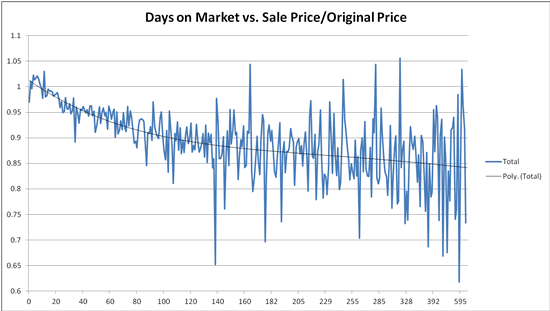Selling your Home - Preparation
This blog post is the first in a series on 'Selling your home'. The series will explain, step by step, important considerations and events that will occur if you plan to sell your home in the near future.
More often than not, if you're thinking about selling your home, you've been thinking about it for some time. For most people it's a gradual process beginning with watching homes that come onto the market in a town that you like, and then progresses to spending occasional Sundays going and investigating Open Houses, and then expands into a full-blown 'we want to move' idea.
Buy or Sell First?
The sequence of whether you buy first and then sell, or sell first and then buy, is covered in another newsletter called 'Timing a Buy and a Sell', but suffice to say that in an appreciating market the general rule is to buy first and then sell, and in a depreciating market it is to sell first and then buy. To understand this concept a little easier, its always best to do the 'hardest' action first. So, when the market is appreciating and inventory is low, with competing offers regularly occurring, you should buy first because that's the hardest to do. When you've successfully bought, then selling is a breeze because inventory is low and its easier to sell in that type of market.
The Goal is to maximize your net selling price
Preparation is key to maximizing your net dollars from a sale. The goal is to have your home looking as clean and move-in ready as possible. Most buyers want a home that they can just move in, unpack, and begin enjoying their new home. Make sure your home is presented as well as you would want it to look if you had your boss, and your bosses boss, and further up the chain of command in your organization coming to pay a visit. Gardens should be weeded and mulched, paths and your front stoop should be in good condition and swept, your windows should be washed, front door clean and tidy with a fresh coat of paint. Its true to say that most buyers decide within the first few minutes of being in a house whether it is the house for them or not. First impressions are key. So, get to work on all of the 'little projects' that you know need to be done, and have been procrastinating about.
Which agent?
Then start doing your homework on agents. Talk to friends about their experiences, good and bad, with different agents. Read as much as you can about the selling process. Each agent handles selling a home differently. Some follow the three 'P's. 'P'ut a sign in the front yard, 'P'ut it into the Multiple Listing Service, and 'P'ray. You're not going to maximize your net dollars from the sale with this approach. Go to Open Houses and see what different agents do when they're there. Does the agent engage with buyers, provide information, answer questions, or does the agent spend their time on the phone or checking email? How is the agent marketing the home? What type of printed information does the agent provide to buyers? Does the agent have a website dedicated to that home? Is the agent using modern technologies like 3D tours to provide additional exposure to the home? Do you receive marketing information about a home in the mail? Does the agent provide a video of the home? Do they provide floor plans? Some agents do the bare minimum - you don't want these agents to sell the most valuable asset you own - your home.

Giving the agent time to advise you is also important. There are many small, but noticeable, things that can be done to present your home in the best light to buyers. Things like having your home be as 'vanilla' as possible - remove all photos, all memorabilia, trophies, diplomas, anything that can identify who the current owners of the house are. You want a buyer to come into a home and envision themselves living in your home - they cannot do that if they see your presence on every wall, or surface. Having your agent show you how to stage your home can help those who are 'decoratively challenged'.
Allow time for marketing material preparation
Presenting your home and providing as much information as possible to the buyer audience is something that every agent should take seriously. MLS allows up to 30 photos to be attached to a listing - you'd be surprised how many homes are listed in MLS with less than 6 photos. Even if the home needs considerable work there is still value in showing anyone who is interested as much as you can of the condition inside the home so that buyers can identify whether it is a home that could be an option for them, whether to move in, or massively renovate. A home movie will also 'walk' buyers through a home and can be a powerful marketing tool. Most often, home videos require about 10 days to arrange a time slot, have video editing done, and for 'posting' online. A 3D tour also allows for a buyer to virtually 'walk' around the home as if they are inside. So, giving the agent time to get all of these marketing tools moving for you is a wise choice. Having floor plans done is also a useful tool for marketing a home. Floor plans help buyers who have specific needs identify if a home will work for them immediately.
Timing your entry onto the market
Timing your home coming onto the market is important, not just seasonally, but with marketing materials ready. In times of low inventory, which is the case in a lot of towns around the area, it doesn't really matter when to bring your home onto the market. There are always buyers looking, apart from the month during Thanksgiving and New Year. If there is one time of the year to avoid, it is then. The last few years, things have been getting busier and busier in the early part of the year also - in the last couple of years, there was significant activity beginning in early January, rather than the traditional start of the spring market in early March.
Pricing strategy
The pricing strategy you use is absolutely the most important decision you can make. Reviewing the graph below shows that the longer a home is on the market, the 'y' axis of the graph, the lower it drops away from the original listing price of the home, the 'x' axis. The longer a home is on the market, the ratio between listing price and sold price drops further and further. Often when a home gets 'stale' (has been on the market for a long period of time - 2 months or more) you often need to drop the price of the home to below what market value was when it was first listed just to entice the serious buyers to come back and see it a second time. When they first saw the home they didn't see any value in it, and its only by continuing to reduce the home, will they then reconsider it as an option.
If I've relayed anything at all its the importance of working in a partnership with your agent to prepare your home for sale, and to ensure that your agent provides a marketing strategy that will expose your home to the largest number of buyers possible to net you the highest price possible for your home.
If you have any questions about any of this then please don't hesitate to reach out to one of us. We would be more than happy to help.






